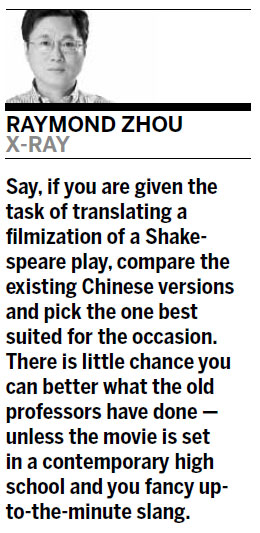Translation misery
I have no idea who was responsible for hiring the translator, who, by the way, is not even mentioned in the superimposed Chinese credits. Could it be Universal Pictures' Chinese office, or the Chinese distributor of the movie? Whoever it is did not conduct due diligence. As it turns out, there are musical aficionados who had been vying with each other in coming up with singable lyrics, which are much more difficult to pull off than a simple conversion with no regard to syllables and tones. Any of the versions available on Chinamusical.net is better than the one used for the theatrical release. All one needs to do is license it, and hopefully have someone double-checking with the movie lyrics.
I strongly suspect the hired translator is an employee of a translating service. These people are supposed to be professionals, yet time and again they have proven to be far less competent than amateurs who pour their hearts - and lots of time - into it.
Translation firms generally deal with business or legal documents, but movie dialogue (let alone lyrics) is tantamount to literary work. It requires people who know the subjects inside and out and have the ability to reproduce it in another language.
So, who are the ones that fit this description? There are two groups as I see it: One is academics and scholars who study the subjects for a living. A few years ago, I was invited to a Kunqu Opera performance of The Peony Pavilion. The English title projection made some foreigners laugh at the wrong moments. I inquired with the production company, who revealed it was done by a translation service. I said it was awful. They knew it because they had observed the reaction of non-Chinese in the audience. They asked me whether I could help "improve" upon it. I said no. There is a professor who devoted his whole life translating this theater classic into English - in its 20-hour entirety, and all they need is to use the lines in their abridged version, with his permission of course.
Say, if you are given the task of translating a filmization of a Shakespeare play, compare the existing Chinese versions and pick the one best suited for the occasion. There is little chance you can better what the old professors have done - unless the movie is set in a contemporary high school and you fancy up-to-the-minute slang.
The other group is skewed toward the young. They are mostly college students who volunteer to translate foreign television shows and movies into Chinese. True, they operate in a legal grey area because they are not authorized by the copyright owners. But they do not make any money out of it, either. They are driven by a passion to share what's hot in the outside world.
For more articles by Raymond Zhou, click here























